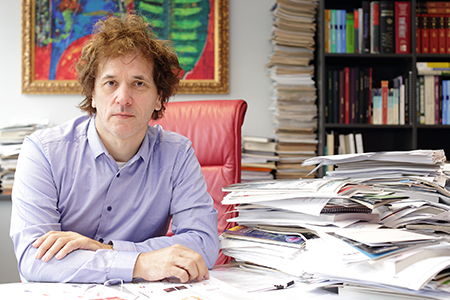
Dr. Josef Penninger
A new discovery by an international research team — co-led by UBC Canada 150 Research Chair Josef Penninger and Harvard Medical School Professor Clifford Woolf — could have implications for therapies for cancer and autoimmune diseases.
In a study published today in Nature, researchers outline a new understanding of the biology of T cells, a type of immune cell in the body, that demonstrates how the cells can be activated to either enhance immunity against cancer or block autoimmune disease.
“One fascinating feature of our discovery is that a system that was actually known in neurobiology for decades can play such a key role in T cell biology,” said study co-author Josef Penninger, the Canada 150 Research Chair in Functional Genetics and director of the Life Sciences Institute who will be arriving at UBC next month.
“As a trained immunologist who was involved in defining some of the key signaling pathways in T cells, it was truly amazing to find such a critical new player in T cell biology,” added Penninger, who is also the founding director of Institute of Molecular Sciences of the Austrian Academy of Sciences. “And since it regulates not only early activation but how T cells grow, the possibilities for medical applications are extremely varied, from controlling autoimmune diseases, asthma and allergies to having a new way to trigger anti-cancer immunity.”
T cells are the soldiers of the immune system and patrol the body seeking out pathogen-infected cells or aberrant cells that could become tumours. When T cells find such a cell, they proliferate and enter “combat mode” to fight danger to the body. However, a common problem is that activated T cells can be directed against the body’s own cells, leading to allergic reactions and autoimmune dis-eases such as colitis, asthma, multiple sclerosis, arthritis, or certain skin diseases.
In the Nature study, the researchers found that BH4—a molecule needed to produce the “happiness hormone” serotonin or dopamine—controls the growth of T cells. In animal models, the researchers found treating mice with BH4 blockers “calmed” T cell activity in inflammatory conditions. Meanwhile, they found that higher levels of BH4 activated growth of T cells, causing tumours to shrink.
“By targeting BH4, we are able to suppress T cell activity in inflammatory conditions and increase their activity in the case of cancer,” said study co-author Woolf, director of the F.M. Kirby Neurobiol-ogy Center at Boston Children’s Hospital. “The ability to target the same pathway in opposite direc-tions is significant and represents a whole new therapeutic approach.”
As part of the study, the researchers have developed a new drug called QM385, which inhibits BH4 production, which they hope to soon start testing in human patients.
The study involved researchers from multiple institutions including the Institute of Molecular Sciences of the Austrian Academy of Sciences, Harvard Medical School, Boston Children’s Hospital, Johannes Gutenberg University Mainz, Medical University of Innsbruck, École Polytechnique Fédérale de Lau-sanne, University of Oxford, Universidade Federal de Santa Catarina, Research Institute of Molecular Pathology, Max Planck Institute for Metabolism Research, Université Laval, Karolinska University Hospital, Johns Hopkins School of Medicine, Apeiron Biologics, Quartet Medicine, and Université de Montréal.